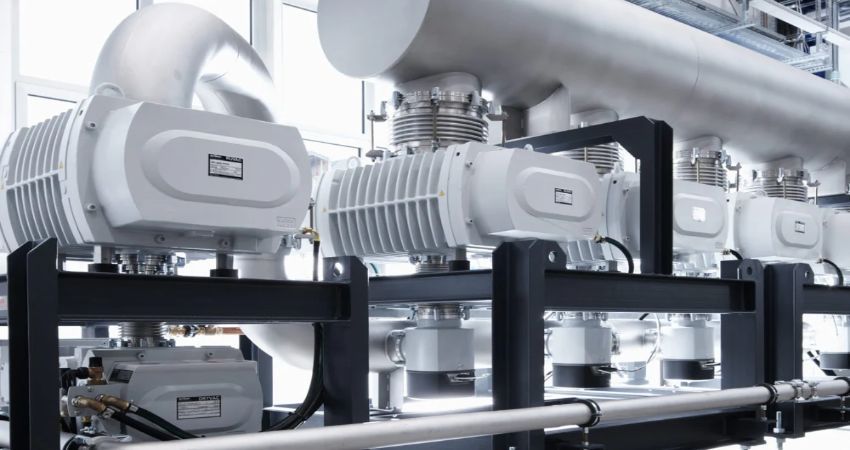Vacuum pump
Which industries are vacuum pumps commonly applied in?
In modern industry, vacuum pumps are almost everywhere. For example, in the electronics industry, it plays an important role in the production stages of microchips and screens, where an absolutely clean environment is required to eliminate moisture and dust. Pharmaceuticals and biology, on the other hand, require vacuum for drying, extraction, and packaging processes, helping drugs maintain stable quality throughout their shelf life. A very reasonable example is the DaiHan V3.VOP100 series, often used in small electronics workshops thanks to its strong suction, compact design, and easy operation.
See more DaiHan models at: DaiHan Vacuum Pumps
In the food sector, vacuum pumps have become a familiar solution in packaging to preserve full flavor and extend shelf life. The air conditioning or refrigeration industry also cannot do without it when it is necessary to completely remove air and moisture before charging gas. Therefore, it can be said that each industry will find a different reason to use vacuum.
The pump lines distributed by EMIN are selected to meet those diverse needs. From small laboratories to large manufacturing plants, customers can all find suitable equipment.
Which businesses should invest in their own vacuum pumps instead of renting services
Outsourcing solutions are often considered economical, but upon careful calculation, for businesses with frequent usage needs, the accumulated cost is much higher compared to investing in equipment. Especially in continuous production, relying on external services can easily cause the production line to stop unexpectedly.

When having their own vacuum pump, businesses are more proactive in terms of progress. Whenever there is a change in the process, the equipment can also be adjusted accordingly, instead of being limited by the service contract. More importantly, this is a long-term investment, helping to better control costs over many years of operation.
The advice from EMIN is that businesses should carefully calculate the frequency of use. For industries that consider vacuum as the foundation for production, investing independently right from the beginning will help minimize risks and increase long-term efficiency.
Important criteria when choosing a vacuum pump for manufacturing plants
In this regard, each industry will have different requirements. Pharmaceutical factories need oil-free pumps to maintain a clean environment, while mechanics or plastics are more concerned with strong suction and durable operation. Many customers have turned to TASCO TA150XK, a two-stage vacuum pump, suction speed of 5.3 CFM (151 L/min), maximum vacuum of 15 microns, power supply 220–240 V.
In addition to suction capacity and durability, noise during operation and power consumption are also factors that are increasingly being considered. A device that runs quietly and saves electricity can make a huge difference in operating costs in the long run. Furthermore, easy replacement of spare parts and maintenance also help the equipment operate more stably throughout its lifecycle.
See more TASCO models at: TASCO Vacuum Pumps
How to calculate vacuum pump capacity and flow rate suitable for actual needs
This is also a question many customers frequently ask when seeking advice, how much capacity is appropriate to choose. To answer, it is necessary to start from the volume of the chamber to be evacuated, the desired vacuum level, and the required time. A pump that is too small will prolong waiting time, reducing production efficiency. A pump that is too large will waste energy and budget unnecessarily.
Engineers often rely on the volume formula combined with the pump’s hourly flow rate to make recommendations. In industries with strict requirements such as electronics or pharmaceuticals, accurate calculation right from the start is a vital factor for the production line to operate stably.
Common errors when operating vacuum pumps and how to fix them
In actual operation, it is not uncommon for pumps to overheat due to continuous operation in poorly ventilated environments. Oil contamination, clogged filters, or worn seals are also frequent incidents. When that happens, the device loses efficiency, consumes more electricity, and risks serious damage.
The key point is early detection. Unusual noise, vibration, or reduced suction capacity are warning signals. Regular oil changes, seal inspections, and filter cleaning are basic steps but help significantly extend service life.
Currently, EMIN is distributing a wide range of vacuum pump lines from reputable brands such as DaiHan, Value, TASCO, Witeg,... see at EMIN Vacuum Pump Catalog with a full range of capacities and configurations to meet the needs from laboratories, small production workshops to large-scale factories. Contact us now to receive a quote soon!
-
-
-
-
-
-
-
-
-
-
-
-
-
-
-
-
-
-
-
-
-
-
-
-